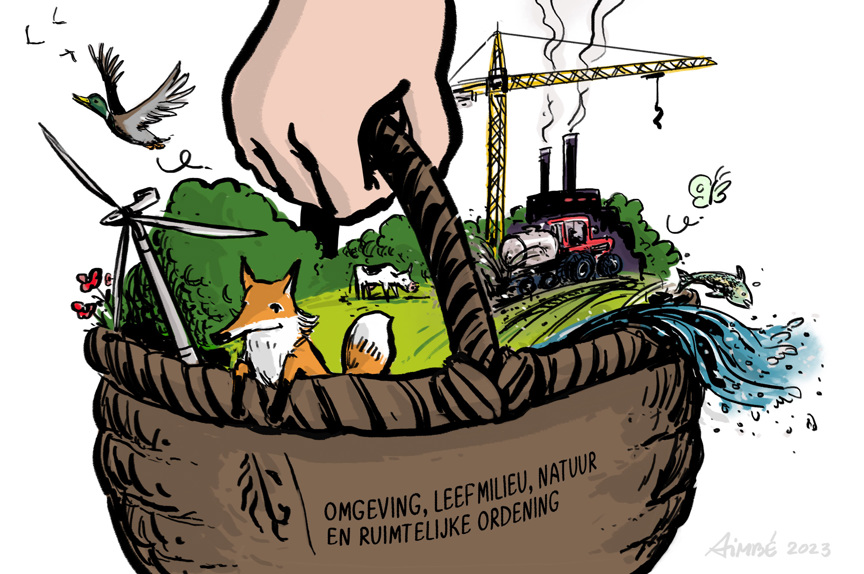- Urban planning and Environmental Law
- Flemish environmental law , Collective Decree , Decree on project decisions and modular environmental permits , Exemption Decree , Project Decision , modular environmental permits , Environmental Decision , spatial impulse projects , works of general interest , works on business activity , Exemptions Decree
Numerous changes to environmental law are imminent today.
For example, the Flemish Government recently ratified two new decrees that will introduce various changes to environmental law: the Collective Decree and the Decree on project decisions and modular environmental permits.
Furthermore, an amendment to the Exemption Decree was previously announced.

1. The Collective Decree
This decree amends 22 laws/decrees relating to environmental law. The main amendments were already discussed in the article published on our website some time ago.
The preliminary draft of this decree was approved in principle by the Flemish Government in November 2022 and ratified on 17 May 2024. It is currently awaiting publication in the Belgian Official Gazette, after which the decree will enter into force after 10 days (subject to some delineated exceptions).
2. The Decree on Project Decision and Modular Environmental Permits
On 17 May 2024, the Flemish Government also ratified the amendments to the Environmental Permit Decree, introducing the modular single permit procedure and the single permit decree.
This decree makes the permit procedure modular, so that the necessary modules can be used depending on the content and nature of the application. It thus abandons the traditional distinction between the ordinary and the simplified procedure. Thus, a decision to organise a public enquiry can only be taken during the procedure, for instance in response to an amendment loop. This would favour solution-oriented licensing.
In addition, this decree also introduces the "Environmental Decision", an instrument to accelerate (1) spatial impulse projects, (2) works of general interest and (3) works on business activity. An environmental decision is a decision on an application for an environmental permit based on an application to amend a current construction plan or spatial implementation plan for the project area. By means of the environmental decision, it is possible to deviate from the existing urban development regulations on the basis of a provisionally adopted Spatial Implementation Plan (SIP), at the initiative of the applicant as part of the application file. An environmental decision gives the right to a final adoption of the SIP, provided that the environmental permit has been correctly implemented in time. No completely new procedure is launched for this purpose; rather, maximum reliance is placed on the permit procedure integrating the main planning aspects.
There are three types of environmental decisions: the environmental decision for spatial impulse projects, the environmental decision for acts of general interest and the environmental decsiion for business activity for an existing, mainly licensed and non-rotting business.
Spatial impulse projects are projects that increase the spatial efficiency of an area in a qualitative way and have a high degree of realisation orientation. They have an explicit focus on function conversion, reuse or temporary use of space.
Acts of general interest concern projects designated by the Flemish Government relating to public infrastructure or public roads, utilities, infrastructure on the territory of several municipalities or infrastructure for the benefit or for the performance of a public service.
An environmental decision for business activity should serve as an instrument for zoned businesses that have been established at a certain location for some time and can remain there. These are businesses with short-term spatial development needs that cannot reasonably be located elsewhere, usually due to the lack of available land within the appropriate zoning category. The environmental decision here replaces the planning certificate, which is being abolished. The aim is to provide a solution for the long time it often took to obtain a planning certificate and, at the same time, to tackle zone alienation.
The entry into force of this system and the Environment decision depends on the amendment of the Environment Permit Decree and the further development of the Environment Counter, which we do not currently have a view on.
However, the administration would aim for a sufficiently long deadline so that municipalities can prepare and adapt their own systems.
3. Amendments to the Exemptions Decree
On 26 April 2024, the Flemish Government approved in principle a draft amending decree that makes some targeted, often technical adjustments to the Exemptions Decree. As a result, certain urban development acts no longer require a permit.
This leads to the necessary simplification and reduction of administrative burdens.
These include the following optimisations:
- an exemption for installing insulation on facades and roofs, except for facades in a heritage context. Until now, this required a permit as the physical building volume is changed by the installation of insulation on the outside of a housing, which is not exempted by the Exemption Decree in its current form.
- some exemptions relating to the felling of high-trunk trees on private and public property are deleted.
- an exemption for the (limited) arching or burying of canals in function of driveways or access to plots;
- Simplification for complex (infrastructure) projects. The current wording of the Exemptions Decree sometimes leads to permit applications that are a real puzzle: certain pieces are exempt, other pieces require a permit, making it very difficult to put together the concrete course of a pipeline, for example;
The draft amending decree is now with the Council of State for advice and may still be subject to changes.
If you would like more information on this subject, please do not hesitate to contact our specialists via info@be.Andersen.com or +32 (0)2 747 40 07.
Read also




